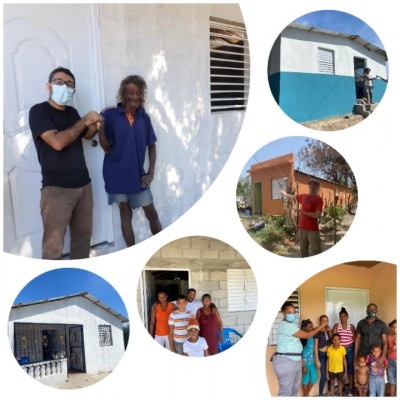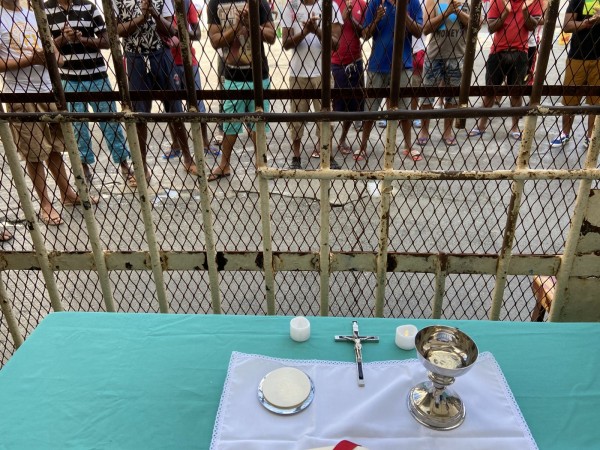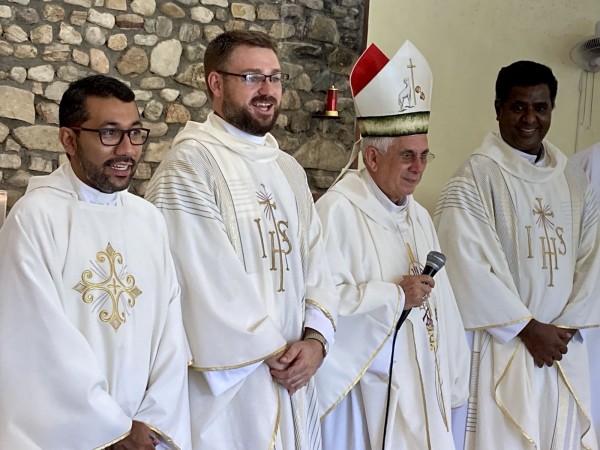
One of the great problems we face here in the southwest of the Dominican Republic is seeing the number of families that do not have decent housing. Many families live in houses made of tin, sticks or "emptying", a very rudimentary type of cement filling.
These families suffer not only the discomfort that entails living in this type of housing, but —especially during the hurricane season— they live in fear that their weak and fragile houses will be lost, and with them their few belongings.
In La Sagrada Familia Parish we carry out a program of home improvement and construction of new houses for the most vulnerable families. Over the past year and a half, thanks to the generosity of St. Lucy and St. Sebastian parishioners in Racine, WI, as well as the Cathedral of Milwaukee, we have had the joy of building eight brand new homes.
The selection of who benefits from this program is never easy, and that is why we carefully evaluate the situation and the history of each family. We always give priority to families who are dealing with someone with a disability, or single-parent families with several sons and daughters, or other similar situations of extreme vulnerability. Personally, I can say that, although the selection process is difficult, it is also a blessing to know the history and the reality of the people. Having a good home only solves one of their many needs, but certainly living with dignity is a fundamental human right.
We pray that in 2022 we may connect with more generous people who will contribute to make a reality the dream of many families here in the Dominican Republic: the aspiration to have a decent, proper home.

One of the greatest prophetic signs of Saint John XXIII during his pontificate was to visit the inmates of the Regina Coeli prison in Rome. With the humility that characterized him, John XIII presented himself to the prisoners as “I am John, your brother. Since you could not leave to see me, I have decided to come and see you." The visit of the "Good Pope" (as he was called) not only filled the inmates of the Regina Coeli prison with hope but also all the prisoners in the world, who began to call the Holy Father "our brother John."
I personally think that prison ministry is one of the best kept secrets of the pastoral and social work carried out by the Catholic Church. Perhaps because sometimes it is difficult to share the comfort and encouragement and all the support that is given to prisoners, in the midst of very sad and difficult situations.
I recently celebrated the tenth anniversary of my ordination to the priesthood, and by the grace of God, I have had the blessing to be able to regularly visit prisoners during the last five years. For four years I went every Wednesday to the federal prison of Sturtevant, Wisconsin, and for the last year, I have been visiting the prison at Km 15 of Azua, here in the Dominican Republic, every other week.
A good friend asked me: what does a priest do during prison visits? I replied: "give hope to the prisoners." I think that is our job, to give hope to a population full of hopelessness, either because of the guilt that they carry, because of the difficulties of the place, because of loneliness, because of the lack of medical attention, because of the hunger that they may end up going through or by the abandonment of their family and friends.
During the years of my formation before ordination, I never thought that I would end up doing prison ministry, much less that this would be a blessing in my ministry. I pray that we never forget all those people who are deprived of their liberty, and that we strive to learn how to give them hope. It is not an easy task, but God always gives us the grace, the resources, and the people that are needed to bring hope to the prisoners.
“Don't worry, hope is for everyone. Also for you.”, said John XXIII to the prisoners of the Regina Coeli prison.
From left to right: Javier Guativa, Mike Wolfe, Msgr. José Grullón and Thomas Naidu
On September 5, the new Pastor of La Sagrada Familia parish, Fr. Javier Guativa, and the new Associate Pastor, Father Thomas Naidu, were installed by Bishop José Grullón, of San Juan de la Maguana. At the same time, Fr. Michael Wolfe, who has been in charge of the parish since June 2019, said goodbye to the community.
Javier and Mike belong to the Community of Saint Paul, and soon Mike will travel to Colombia, where he will team up with Martí Colom at La Resurrección Parish, located in the south of Bogotá. Javier, for his part, has worked nine years as a priest in different parish assignments in Milwaukee before going to La Sagrada Familia. Father Thomas Naidu, originally from India and ordained 16 years ago, has carried out his pastoral ministry in the Archdiocese of Milwaukee for the last four years. Javier and Thomas will work as a team with the group of lay members of the Community of Saint Paul that has been present for many years in Sabana Yegua and its surrounding communities.
This past weekend the parish community gave a warm welcome to the two new priests and thanked Fr. Mike for his service there, wishing him many blessings in his new endeavors.
Christmas is a very popular feast, and there is no doubt that we are invited to celebrate it from its clearly Christian perspective, assimilating the more theological dimensions that it offers us.
One of these dimensions would be to see Christmas as a sign of communication: communication from a God who made Himself one in the midst of us, to transmit His message of salvation and love. In a society such as ours, in which communication advances faster and faster each day, and in which it seems that we are always connected, it’s good to reflect on how the feast of Christmas can help us.
God communicates Himself with tenderness: there is nothing more tender and fragile than a child. God doesn’t express Himself with violence, nor with big banners or billboards. He expresses himself with the sweetness of a newborn baby whose face is etched with traces of kindness, compassion and the love of His Father.
God communicates Himself with simplicity: “She gave birth to her first-born son and wrapped him in swaddling clothes and laid him in a manger”. Jesus’ birthplace is humble. In a society frequently drunk with consumerism and abundance, the feast of Christmas is a call to live what is important, to discover that the best gift we can receive is the company of our family and friends.
God communicates Himself with hope: “Do not be afraid. I come to proclaim good news to you, tidings of great joy to be shared by the whole people” say the angels to the shepherds. As worried as we may be with the problems of life, and as dark as we may view at times the social or ecclesial landscape, it is good that we allow ourselves to become filled with the happiness and the hope of today’s celebration. It is urgent that we Christians may proclaim, for ourselves, and for all willing to hear it, a message of joy, underscoring the blessings that come from God through the feast of the birth of His Son.
Let us allow the feast of Christmas to speak to us and help us improve our communication. That tenderness, simplicity and hope may help us communicate the joy of Christmas.
As is well known, the word "Pentecost" comes from the Greek and means the fiftieth day. The number 50 is, for the Jews, a symbol of fullness: a week of weeks (seven by seven, plus one). This feast, which originally had an agricultural character, is celebrated fifty days after the Jewish Passover. It is thought that fifty days after the exodus from Egypt, the people of Israel sealed the covenant with Yahweh on Mount Sinai under the guidance of Moses.
Today, seven weeks after Jesus’ resurrection, Christians celebrate the outpouring of the Spirit to the apostolic community, not as an independent feast, but as the culmination of Easter: "Receive the Holy Spirit!"
In the midst of the bustle of people of different tongues who came to Jerusalem to celebrate the Jewish Pentecost, the Holy Spirit gave the apostles the strength to communicate Jesus’ message of love to all. After the departure of the Lord, confusion and dispersion could have triumphed, but the Holy Spirit inspired the community of disciples to work for the common good and to share the message of unity with all the nations. In this way the Risen One reaches the ends of the earth.
In a society as polarized and fragmented as ours is, we need to live celebrating Pentecost. We ask for the presence of the Holy Spirit, and we can say:
Come Holy Spirit, teach us to dialogue as brothers and sisters.
Come Holy Spirit, help us to understand the language of the adversary.
Come Holy Spirit, teach us to discover that we are all brothers and sisters.
Come Holy Spirit, free us from the threat of turning our countries into a new Babel, incapable of building a future of fraternity.
Come Holy Spirit, and free us from intolerance, from stubbornness, which increasingly distances us from all effective collaboration.
May we repeat among ourselves those words of Paul to the first Christian communities: "Do not stifle the Spirit" (1Thes 5,19). Let us not weaken our faith in the Father of all, and let us not quench our hope for a more fraternal society.
In June, Fr. Javier Guativa, from the CSP, became the new Administrator of two parishes in Racine, Wisconsin
After five years of pastoral work on the Southside of Milwaukee, Javier Guativa, a priest of the Community of St. Paul, was appointed by Archbishop Jerome E. Listecki as the Parish Administrator of Saint Lucy and Saint Sebastian parishes in Racine and nearby Sturtevant.
The parish of Saint Lucy, located in southeastern Racine, is the largest parish in Racine with 5,550 members and a school of 282 students. It has a variety of ministries for youth and adults as well women’s groups and a men’s Bible group that meets every Saturday to discuss the Sunday readings. Saint Sebastian parish is located to the west of Saint Lucy. It is a rural parish with 1,254 members, many of whom are local farmers.
The two parishes have been operating together as a cluster for the past two years, sharing the priest and the various ministries, which helps make the two communities grow together in faith.
We are pleased that Javier will now work pastorally in Racine, where Ricardo Martín and Antony Thomas, also priests of the CSP, are already pastors, and where our Community has its international headquarters.

Javier Guativa
The feast of the Epiphany (the feast of the manifestation of the Lord to all humanity) is the feast of light. “Rise up in splendor, Jerusalem! Your light has come, the glory of the Lord shines upon you” (Is 60:1). With these words of the prophet Isaiah, the Church describes the content of this beautiful Feast.
Matthew is the only evangelist who tells the story of the Magi who came to see the newborn Messiah. Mathew’s account aims to show that Jesus is the promised Messiah, that he fulfilled what the prophets announced about the Gentiles arriving to Jerusalem (Is 60:6; Sal 72:10+). It also shows that God has expanded His blessing and privilege of the historic Israel to the Church, largely Gentile.
Focusing on Matthew’s account, let us see how we can put it into practice what the Gospel teaches us, so that this Feats of light can illuminate our path, as the star illuminated the path of the Magi from the East to Bethlehem.
“Behold, magi from the east arrived in Jerusalem” (Mt 2:1b)
To start living the “manifestation” of God in our lives, we have to leave from where we are. God wants to be present in our lives, but it depends on us to start walking.
It would be good to ask what kind of journey are we invited to travel. From where do we have to leave? What are the attitudes that we have to change?
God wants to be present in our lives and to enlighten our way, but this will be difficult if we do not cooperate, if we are anchored in the same place, arguing that our own perspectives and opinions are the only valid points of view.
“Where is the newborn king of the Jews? We saw his star at its rising and have come to do him homage”(Mt 2:2).
The “manifestation” of God is silent: a star! Beautiful and at the same time distant. Do not expect from God something so powerful that it may force us to act, because if we do, we will be going the wrong way. The Magi could have ignored that sign and have continued with their daily lives.
Throughout our lives God brightens our way with lights that allow us to glimpse the path, but we must be attentive, vigilant. The manifestation of God does not bring large banners. When we feel that God is silent, we should know that He speaks in a language that is unique.
We are invited to be led by the contagious light of the Lord and by other people who are continuously present in our journey; understanding life as an “adventure”; risking to accept the challenges of a future marked by the enthusiasm and hope that leads to Bethlehem, to a joyful encounter.
“Then Herod called the magi secretly (…) After their audience with the king they set out. And behold, the star that they had seen at its rising preceded them, until it came and stopped over the place where the child was” (Mt 2:7a; 2:9).
The Magi are a good example of how to overcome the dark nights that we have in our journey of faith. The Magi sensed that when they entered the palace of Herod (a place of power and wealth) the star disappeared.
The only thing that the Magi found in Herod’s palace was jealousy and the king’s fear of losing its power. Like Herod, we too can be tempted to shine, to cling to the little “kingdoms” we have instead of serving others. Then our life becomes bitter and bitterness affects others, because we do not find peace.
The Magi sensed that Herod, the new Pharaoh, wanted to enslave them. Resuming the path of silence and humbleness on which they started, they went away and the star shined again, the Magi overcame darkness and were filled with joy.
“And having been warned in a dream not to return to Herod, they departed for their country by another way” (Mt 2:12b).
We are transformed by the experience of encountering the presence of God in the world. After this encounter, we can no longer live as we did before. We must take the path of love and fidelity, sacrifice and selflessness, joy of daily work well done, patience in the contradictions and gentleness in dealing with others. This is the path that leads us to walk, as new stars of Bethlehem for others.
The early Christians, by reading the episode of the Magi, understood very well that Jesus would be the salvation for all humanity.Today, let us feel closer to the Magi, wise companions who encourage us to raise our eyes and see the stars that continue to illuminate our path.



